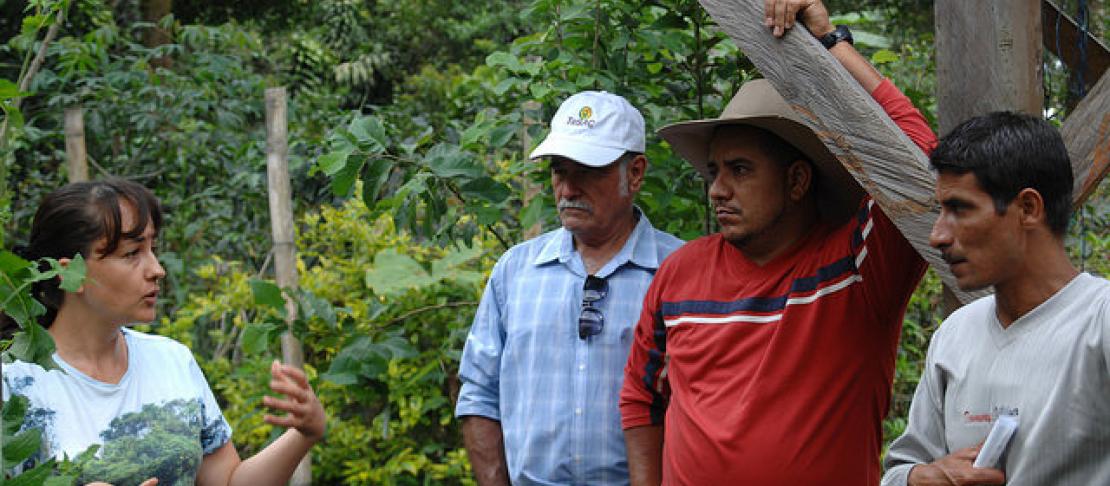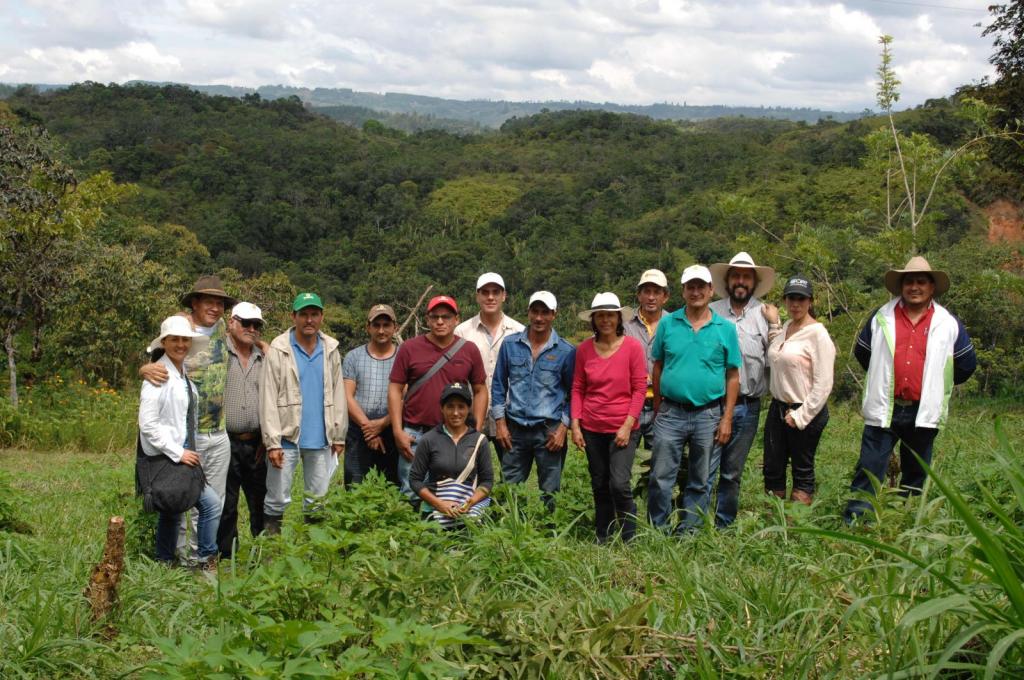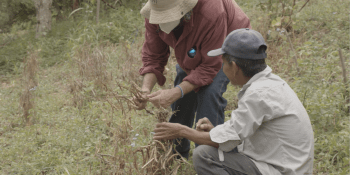Face to face: Colombia-Honduras knowledge exchange on adaptation within the Climate-Smart Villages framework

Farmers and experts from Colombia and Honduras exchange knowledge on climate-smart agriculture practices.
Producers and experts from Climate-Smart Villages (CSV) of Cauca, Colombia and Santa Rita, Honduras, took part in a knowledge exchange on adaptation, organized by the Regional Gateway for Technology Transfer and Climate Change Action in Latin America and the Caribbean (REGATTA). The exchange took place between 26 and 30 June and 31 July to 5 August. The REGATTA initiative is supported by the Global Adaptation Network (GAN) and the Climate Technology Centre and Network (CTCN).
This initiative aimed to bring together producers from both CSVs in order to exchange experiences from the field, knowledge on participatory planning tools they use for adaptation, as well as on designing and implementing adaptation methods that increase households’ resilience in the face of a variable, changing climate. This was also an opportunity for the Honduran Ministry of Agriculture and Livestock (SAG) and the Autonomous Regional Corporation of Cauca (CRC) to strengthen their connection for mutual collaboration.
The exchange took place in two stages: first, producers of CSV Santa Rita from Honduras visited their counterparts in Cauca, followed by technical experts, producers and a representative from the Cauca government visiting Honduras. Work methodology involved “learning by doing” and joint sessions for reflection. The institutions which ensured the project’s success were Ecohabitats Foundation in Cauca, the Commonwealth of Municipalities of the Maya route (MANCORSARIC) in Santa Rita and the Tropical Agricultural Research and Higher Education Center (CATIE) within the scope of CCAFS-CIAT.
The CSVs are living laboratories that show how different actors in the same territory develop together, test, adopt and evaluate portfolios of integrated and innovative options, aiming to practice a climate-smart agriculture and to improve the livelihoods of rural populations. This is the first time farmers from CVS are visiting their counterparts in other countries in the region. Find out more.
The agenda included visiting farms in the Tierra Fria No. 1 community which implemented a CATIE home garden and farm planning methodology, as well as climate-smart agriculture practices. The latter included a vertical garden, elaborating agroecological alternatives for disease and pest control and plant nutrition, as well as a filtering system for wastewater. Colombia’s delegation also had the chance to take part in the first Regional Agroclimatic Roundtable for the Western subregion of Antioquia, where the Honduras Permanent Emergency Committee (COPECO) presented farmers, technical experts and other relevant actors with climate projections. In turn, they discussed recommendations to be included in Occidente’s Agroclimatic Bulletin, a publication that was also a product of a Colombia-Honduras exchange. Also, the initiative allowed Cauca’s delegates, led by the CRC director, to meet with the head of the Management Planning and Evaluation Unit of SAG, in order to form a South-South alliance that would allow the development of a common working agenda for both institutions. This would strengthen and stimulate the introduction of climate change adaptation policies, while meeting mitigation goals would create synergies and bring in further benefits.

Visitors from Honduras CSV at the Chara-Vargas family climate-smart agriculture farm in Cauca CSV. Photo: Luis Alfonso Ortega Fernandez
According to Sebastián Rodriguez of the United Nations Environment Programme (UN Environment), the CSV research for development project implemented by CCAFS, as well as producers learning from other producers were key in making this exchange proposal a reality.
The most important knowledge on adaptation is usually the practical knowledge of how to coordinate and confront specific adaptation challenges and obstacles. This kind of day-to-day knowledge cannot be obtained from scientific literature or classes. One gains that from direct contact, from exchanges with other producers that are facing similar conditions” (Global Adaptation Network 2017)
Multiple mutual lessons emerged throughout the exchange:
- The community is supposed to lead its own processes of change and transformation, as it is the people that have a clear image of how to address challenges raised by climate and other factors in order to improve and maintain their livelihoods; therefore, community organizing and empowering all household members is critical.
- Processes in Cauca and Santa Rita’s CSVs are different, as they each experience distinct opportunities and challenges. For instance, the CRC highlighted that Santa Rita has advanced significantly on an institutional level. At the same time, when it comes to households, there is still need for collaboration and leadership. On the contrary, Cauca’s strengths lie in the household, with still a long way to go in the case of institutions. This is why climate-smart agriculture actions need to be built by taking into account the local context.
- Planning adaptation at plot and farm level is fundamental in creating a community and family vision that looks beyond the short term, in which household members analyse, understand and appreciate the vulnerabilities they are facing; this is key for them to confidently plan their actions on the farm.
- Involving young people remains challenging in both Cauca and Santa Rita; including them in developing climate-smart agriculture at the community level is essential.
- Women have great potential to foster change among their communities. As they organize the household, provide food and nutritional security and act as productive entrepreneurs, they need to be actively involved in climate change adaptation in agriculture.
The exchange concluded with a commitment from producers, Ecohabitats, MANCORSARIC, CCAFS, CIAT, CATIE, SAG and CRC to support CSV processes in Cauca and Santa Rita. This is a new wager to generate scientific information that will sustain climate smart agriculture practices in other territories in the region.
Read more:
Efraín Leguia is the coordinador of the Climate-Smart Villages of Central America. This story was translated from Spanish by Alexandra Popescu.



